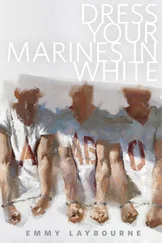After finishing our coffees, Lisa and I drove to Greensboro, where I delivered my scheduled lecture. That is to say, I read stories about my family. After the reading, I answered questions about them, thinking all the while how odd it was that these strangers seemed to know so much about my brother and sisters. In order to sleep at night, I have to remove myself from the equation, pretending that the people I love expressly choose to expose themselves. Amy breaks up with a boyfriend and sends out a press release. Paul regularly discusses his bowel movements on daytime talk shows. I'm not the conduit, but just a poor typist stuck in the middle. It's a delusion much harder to maintain when a family member is actuallyin the audience.
The day after the reading, Lisa called in sick and we spent the afternoon running errands. Winston-Salem is a city of plazas — midsize shopping centers, each built around an enormous grocery store. I was looking for cheap cartons of cigarettes, so we drove from plaza to plaza, comparing prices and talking about our sister Gretchen. A year earlier she'd bought a pair of flesh-eating Chinese box turtles with pointed noses and spooky translucent skin. The two of them lived in an outdoor pen and were relatively happy until raccoons dug beneath the wire, chewing the front legs off the female and the rear legs off her husband.
"I may have the order wrong." Lisa said. "But you get the picture."
The couple survived the attack and continued to track the live mice that constituted their diet, propelling themselves forward like a pair of half-stripped Volkswagens.
"The sad part is that it took her two weeks to notice it," Lisa said. "Two weeks!" She shook her head and drove past our exit. "I'm sorry, but I don't know how a responsible pet owner could go that long without noticing a thing like that. It's just not right."
According to Gretchen, the turtles had no memories of their former limbs, but Lisa wasn't buying it. "Oh, come on," she said. "They must at least have phantom pains. I mean, how can a living creature not mind losing its legs? If anything like that happened to Chessie, I honestly don't know how I could live with myself." Her eyes misted and she wiped them with the back of her hand. "My little collie gets a tick and I go crazy."
Lisa's a person who once witnessed a car accident, saying, "I just hope there isn't a dog in the backseat." Human suffering doesn't faze her much, but she'll cry for days over a sick-pet story.
"Did you see that movie about the Cuban guy?" she asked. "It played here for a while but I wouldn't go. Someone told me a dog gets killed in the first fifteen minutes, so I said forget it."
I reminded her that the main character died as well, horribly, of AIDS, and she pulled into the parking lot, saying, "Well, I just hope it wasn't areal dog."
I wound up buying cigarettes at Tobacco USA, a discount store with the name of a theme park. Lisa had officially quit smoking ten years earlier and might have taken it up again were it not for Chessie, who, according to the vet, was predisposed to lung ailments. "I don't want to give her secondhand emphysema, but I sure wouldn't mind taking some of this weight off. Tell me the truth, do I look fat to you?"
"Not at all."
She turned sideways and examined herself in the front window of Tobacco USA. "You're lying."
"Well, isn't that what you want me to say?"
"Yes," she said. "But I want you to really mean it."
But Ihad meant it. It wasn't the weight I noticed so much as the clothing she wore to cover it up. The loose, baggy pants and oversize shirts falling halfway to her knees: This was the look she'd adopted a few months earlier, after she and her husband had gone to the mountains to visit Bob's parents. Lisa had been sitting beside the fire, and when she scooted her chair toward the center of the room, her father-in-law said, "What's the matter, Lisa? Getting too fat — I mean hot. Getting too hot?"
He tried to cover his mistake, but it was too late. The word had already been seared into my sister's brain.
"Will I have to be fat in the movie?" she asked.
"Of course not," I said. "You'll be just. . like you are."
"Like I am according to who?" she asked. "The Chinese?"
"Well, notall of them," I said. "Just one."
Normally, if at home during a weekday, Lisa likes to read nineteenth-century novels, breaking at one to eat lunch and watch a television program called Matlock . By the time we finished with my errands, the day's broadcast had already ended, and so we decided to go to the movies — whatever she wanted. She chose the story of a young Englishwoman struggling to remain happy while trying to lose a few extra pounds, but in the end she got her plazas confused, and we arrived at the wrong theater just in time to watch You Can Count on Me , the Kenneth Lonergan movie in which an errant brother visits his older sister. Normally, Lisa's the type who talks from one end of the picture to the other. A character will spread mayonnaise onto a chicken sandwich and she'll lean over, whispering, "One time, I was doing that? And the knife fell into the toilet." Then she'll settle back in her seat and I'll spend the next ten minutes wondering why on earth someone would make a chicken sandwich in the bathroom. This movie reflected our lives so eerily that for the first time in recent memory, she was stunned into silence. There was no physical resemblance between us and the main characters — the brother and sister were younger and orphaned — but like us, they'd stumbled to adulthood playing the worn, confining roles assigned to them as children. Every now and then one of them would break free, but for the most part they behaved not as they wanted to but as they were expected to. In brief, a guy shows up at his sister's house and stays for a few weeks until she kicks him out. She's not evil about it, but having him around forces her to think about things she'd rather not, which is essentially what family members do, at least the family members my sister and I know.
On leaving the theater, we shared a long, uncomfortable silence. Between the movie we'd just seen and the movie about to be made, we both felt awkward and self-conscious, as if we were auditioning for the roles of ourselves. I started in with some benign bit of gossip I'd heard concerning the man who'd played the part of the brother but stopped after the first few sentences, saying that, on second thought, it wasn't very interesting. She couldn't think of anything, either, and so we said nothing, each of us imagining a bored audience shifting in their seats.
We stopped for gas on the way home and were parking in front of her house when she turned to relate what I've come to think of as the quintessential Lisa story. "One time," she said, "one time I was out driving?" The incident began with a quick trip to the grocery store and ended, unexpectedly, with a wounded animal stuffed into a pillowcase and held to the tailpipe of her car. Like most of my sister's stories, it provoked a startling mental picture, capturing a moment in time when one's actions seem both unimaginably cruel and completely natural. Details were carefully chosen and the pace built gradually, punctuated by a series of well-timed pauses. "And then. . and then…" She reached the inevitable conclusion and just as I started to laugh, she put her head against the steering wheel and fell apart. It wasn't the gentle flow of tears you might release when recalling an isolated action or event, but the violent explosion that comes when you realize that all such events are connected, forming an endless chain of guilt and suffering.
I instinctively reached for the notebook I keep in my pocket and she grabbed my hand to stop me. "If you ever," she said, "everrepeat that story, I will never talk to you again."
Читать дальше












